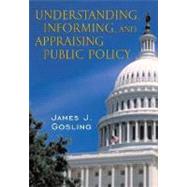
| Preface | xi | ||||
| Chapter 1. Enduring Political Questions and Public Policy | 1 | (22) | |||
|
1 | (3) | |||
|
4 | (3) | |||
|
7 | (1) | |||
|
8 | (3) | |||
|
11 | (9) | |||
|
12 | (2) | |||
|
14 | (1) | |||
|
14 | (4) | |||
|
18 | (2) | |||
|
20 | (3) | |||
| Chapter 2. Fragmented Government and Policy Making | 23 | (15) | |||
|
25 | (6) | |||
|
27 | (1) | |||
|
27 | (2) | |||
|
29 | (2) | |||
|
31 | (5) | |||
|
33 | (3) | |||
|
36 | (2) | |||
| Chapter 3. Agenda Setting and the Policy Process | 38 | (14) | |||
|
40 | (4) | |||
|
44 | (1) | |||
|
44 | (6) | |||
|
46 | (1) | |||
|
47 | (1) | |||
|
48 | (2) | |||
|
50 | (2) | |||
| Chapter 4. Comparing Federal and State Policy Making | 52 | (21) | |||
|
54 | (6) | |||
|
54 | (1) | |||
|
55 | (1) | |||
|
56 | (1) | |||
|
56 | (3) | |||
|
59 | (1) | |||
|
60 | (5) | |||
|
65 | (1) | |||
|
66 | (5) | |||
|
71 | (2) | |||
| Chapter 5. Informing Public Policy Choice | 73 | (14) | |||
|
74 | (3) | |||
|
75 | (1) | |||
|
76 | (1) | |||
|
77 | (1) | |||
|
77 | (1) | |||
|
78 | (1) | |||
|
79 | (2) | |||
|
81 | (5) | |||
|
81 | (2) | |||
|
83 | (3) | |||
|
86 | (1) | |||
| Chapter 6. Explaining Public Policy Choice | 87 | (15) | |||
|
90 | (1) | |||
|
90 | (3) | |||
|
90 | (1) | |||
|
91 | (1) | |||
|
92 | (1) | |||
|
93 | (4) | |||
|
93 | (1) | |||
|
94 | (1) | |||
|
94 | (1) | |||
|
95 | (2) | |||
|
97 | (3) | |||
|
100 | (2) | |||
| Chapter 7. Implementing and Evaluating Public Policy | 102 | (19) | |||
|
103 | (5) | |||
|
104 | (1) | |||
|
104 | (1) | |||
|
105 | (1) | |||
|
106 | (1) | |||
|
107 | (1) | |||
|
108 | (3) | |||
|
110 | (1) | |||
|
111 | (2) | |||
|
113 | (3) | |||
|
116 | (3) | |||
|
118 | (1) | |||
|
119 | (2) | |||
| Chapter 8. Informing and Shaping Contemporary Policy Choice | 121 | (23) | |||
|
122 | (7) | |||
|
122 | (3) | |||
|
125 | (4) | |||
|
129 | (5) | |||
|
129 | (2) | |||
|
131 | (3) | |||
|
134 | (5) | |||
|
134 | (2) | |||
|
136 | (1) | |||
|
136 | (3) | |||
|
139 | (2) | |||
|
141 | (3) | |||
| Chapter 9. Appraising America's Public Policy Performance | 144 | (13) | |||
|
147 | (1) | |||
|
147 | (1) | |||
|
148 | (2) | |||
|
150 | (3) | |||
|
153 | (2) | |||
|
155 | (2) | |||
| Index | 157 |
The New copy of this book will include any supplemental materials advertised. Please check the title of the book to determine if it should include any access cards, study guides, lab manuals, CDs, etc.
The Used, Rental and eBook copies of this book are not guaranteed to include any supplemental materials. Typically, only the book itself is included. This is true even if the title states it includes any access cards, study guides, lab manuals, CDs, etc.